Hoka Speedgoats for the Camino (2026 Review)
The Hoka Speedgoat is so popular it's practically become the unofficial trail shoe of the Camino de Santiago–but is it the right fit for your feet?
I've hiked three Caminos in Hoka Speedgoats now:
- Hoka Speedgoat 5 on most of the Camino Francés in 2023 (346 miles/556 km)
- Hoka Speedgoat 6 on the Camino Portugués Central from Porto in 2025 (151 miles/243 km)
- Same pair of Hoka Speedgoat 6s on the Camino Portugués Coastal/Spiritual Variant from Porto in 2025 (175 miles/282 km)
I started the Francés in a pair of hiking boots. Big mistake. My feet were wrecked–until I bought a pair of Speedgoats that absolutely saved me!
Outside of the Camino, I run marathons and swear by Hokas. Their ultra cushioning has made me a big fan and is a huge reason why I chose their shoes for my Caminos.
Whether you're a first-time Camino pilgrim or are returning for another Camino and trying to find a better shoe, this post is for you. I'll cover everything from cushioning and support to how these shoes handle rain, rocky terrain, and more to help you decide if you should try Hoka Speedgoats for the Camino.

Hoka Speedgoat 6 at a Glance
Hoka released the latest model, the Speedgoat 6, in 2024. Here's an overview of the latest model's key features and specs:
- Type: Trail running, good for rugged trails and a variety of terrain
- Weight: 8.20 oz (232.5 g) (women's size 8)
- Heel-to-toe drop: 5.00 mm
- Stability: Neutral
- Cushion: Maximum cushion (Hoka calls it balanced)
- Sizing: They tend to run a bit small; for those who need extra width, they offer wide sizes
- Average price: $155.00
As I mentioned above, these shoes are incredibly popular. But just how popular are they?
Well, I recently polled 277 other people who have walked the Camino, and the Hoka Speedgoat tied for the #1 most popular shoe, making it the shoe of choice for about 1 in every 5 pilgrims.
Hoka gives a nice overview of the shoe in this video:
History of the Shoe
Funny enough, Hoka's origins aren't too far from the Camino de Santiago. Even though the company's based in the U.S. now, Hoka started in the French Alps with the intention of designing trail running shoes good for running down steep mountains in the Alps, Pyrenees, and Dolomites.
The company launched the Speedgoat in 2015, which has since become their signature trail running shoe.
The Speedgoat is named after Hoka's first U.S.-sponsored athlete Karl Meltzer, an ultrarunner and ultramarathon coach. He holds the record for most 100-mile race wins, and in 2016, he ran the fastest known time on the Appalachian Trail.
Meltzer's friends gave him the nickname Speedgoat, and he worked with Hoka to create the shoe.
Hoka released a neat video sharing more of about Meltzer's journey and the shoe's origins:

My Experience with Hoka Speedgoats on the Camino Broken Down by Feature
Alongside selecting the right backpack, choosing the right shoe for the Camino is one of the most important things to do to prepare. As you consider the Hoka Speedgoat for your Camino, there are a number of different features to consider. I've broken those down below, layering in my own experiences wearing these shoes on my three Caminos.
Shoe Type
The Hoka Speedgoat is a trail running shoe, which is the most commonly worn and recommended shoe on the Camino de Santiago.
Why? Well, much of the Camino is along fairly even terrain, especially along the routes most pilgrims choose to hike. While you can encounter some challenging terrain, there's a lot of walking along paved roads or packed gravel paths.
In addition, with walking for hours day after day on the Camino, you want a shoe that's going to be breathable, comfortable, and lightweight.
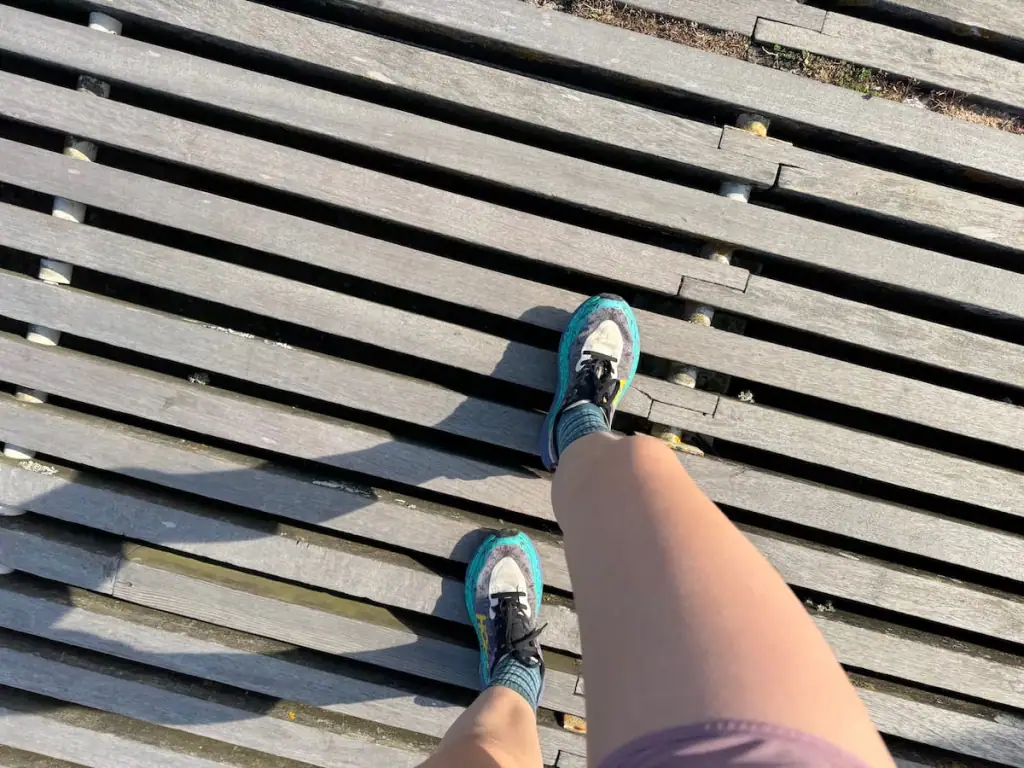
Weight
With the women's size 8 shoe weighing 8.20 oz (232.5 g), these are fairly lightweight trail running shoes. While you're not necessarily likely to notice a difference in weight among shoes, heavier shoes can potentially have an impact on your body over time.
In my own experience, I never felt like Hoka Speedgoats were heavy on my feet, even when I was walking 20+ mile (32+ km) days on the Camino.
Heel-to-Toe Drop
The Speedgoat has a 5.00 millimeter heel-to-toe drop. This is considered a moderate drop and similar to most trail running shoes.
You're probably already used to this kind of drop in any running shoes you're already wearing. This kind of drop works well for most people no matter how you naturally step down your foot.
Stability
With a neutral amount of stability, the Hoka Speedgoats give you just enough stiffness to help protect and support your feet while still providing flexibility.
When I've worn my Hokas on the Camino, my feet feel well supported, but I appreciated the amount of give in the shoes that made it easier to navigate some sections of the trail when I needed to stretch my foot out a bit more.
Connect with Other Women Hiking the Camino
Join my free Facebook group! We're building up a community of women who have hiked or are planning to hike the Camino there. You can also get personalized support from me!
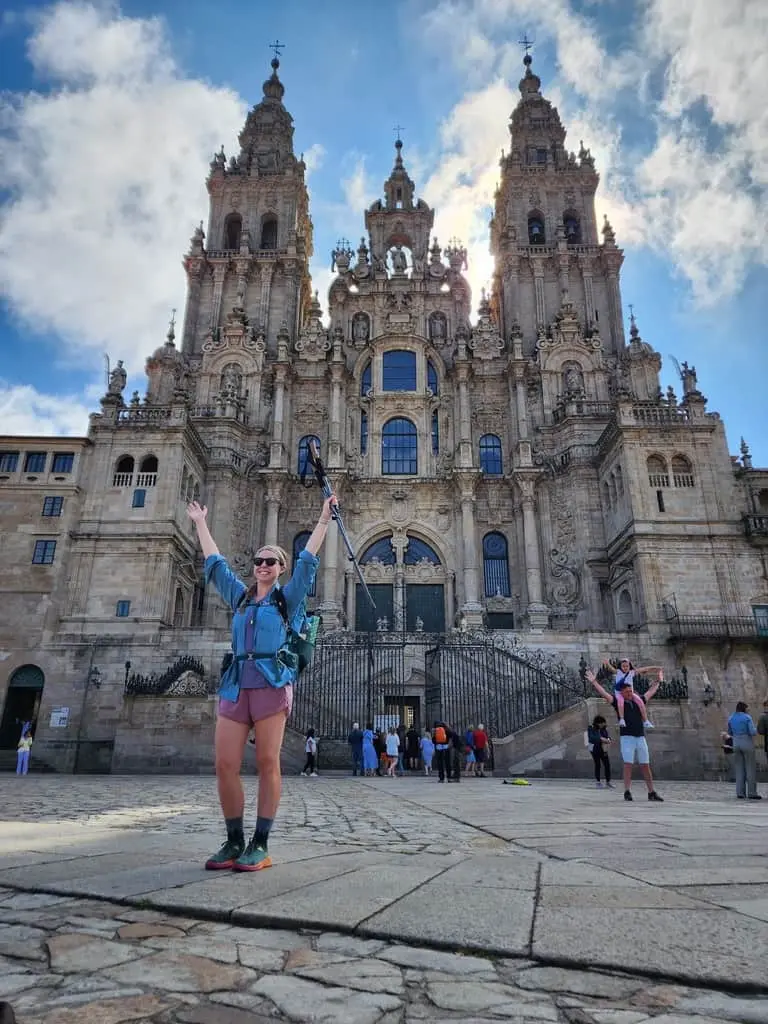
Cushion
While Hoka says the cushion in these shoes is “balanced,” Hoka's shoes are known as some of the most cushioned on the market. So while the Speedgoats have less cushion than some of Hoka's other shoes, they are much more cushioned than your typical trail running shoe.
Heel and forefoot stack height are used to measure the amount of cushion in a shoe. Here's the Hoka Speedgoat compared to the Altra Lone Peak for reference to help you see just how cushioned these are:
- Hoka Speeadgoat: 38 mm heel stack height, 33 mm forefoot stack height
- Altra Lone Peak: 25 mm heel stack height, 25 mm heel stack height
In my opinion, the Hoka Speedgoats are a great shoe for many people on the Camino because of this thick cushioning. Walking so long day after day takes its toll, so every little bit of added comfort you can get can help.
The downside to more cushioning is that it can make it hard to feel the ground below you. This could be challenging for some people who might feel more unsteady on their feet without more of that ground feel below.
Personally, I've had ankle issues in the past so worry about any kind of shoe that might make me prone to spraining my ankle. I've felt totally fine in the Hoka Speedgoats on all three of my Caminos, but that said, everyone has different feet and preferences so you'll want to try them out yourself and see if you like this level of cushion.
General Fit
The Hoka Speedgoat tends to run a little smaller. I recommend getting at least a half or full size larger than you usually do, especially for the Camino when your feet are likely to swell.
I usually wear a U.S. size 6.5 but purchased a size 7.5 in these shoes to have extra room. Even before my feet swelled up, I was able to tie the laces tighter and still felt secure and comfortable in them.
The tongue on these is a little short, but that's really my only complaint when it comes to fit. Otherwise, they were perfect. They didn't hurt my feet or give me blisters.
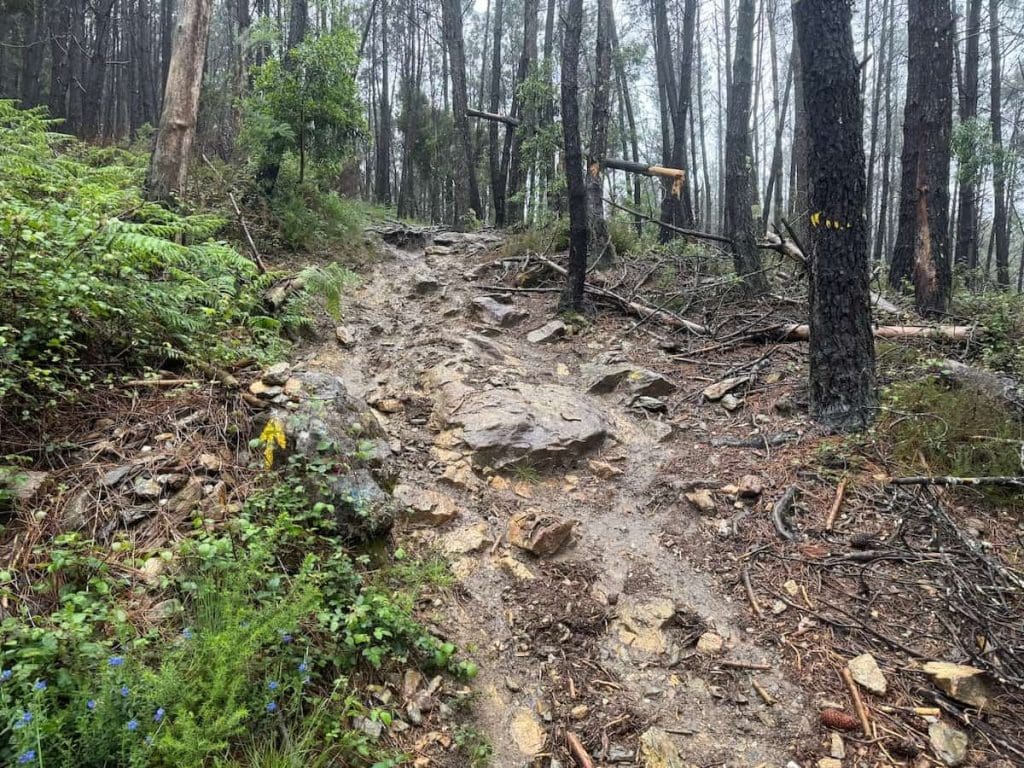
Grip
The Hoka Speedgoat 6 has a Vibram® Megagrip outsole with 5 millimeter Traction Lugs. If you're not familiar with lugs (I wasn't myself until writing this article), they're the grippy parts that stick out of the shoes kind of like soccer cleats.
According to Hoka, Vibram® Megagrip is a high-performance durable rubber compound made to grip both wet and dry surfaces. They say the Traction Lugs are shaped to increase surface contact with softer ground, helping with traction and stability.
5 millimeter lugs are fairly deep, which means they can provide a stronger grip on trails. That said, some people might find lugs this deep feel clunky walking on roads.
I found the grip to be really good on both of my Caminos. I walked up and down very steep, and sometimes wet, trails and roads and always trusted my shoes to maintain a strong grip.
When I hiked the Camino Portugués Central route, it was pouring rain the day I hiked up and down from the tallest point on that route. The path in that section was more like an actual hiking trail with lots of rocks and roots that were super wet from the rain. I didn't slip once in my shoes and didn't worry about it at all while hiking.
I didn't find the lugs too thick for me personally when walking along roads, boardwalks, or other flat surfaces.
Breathability
The Hoka Speedgoats are a breathable shoe with their lightweight woven textile upper. They didn't hold my sweat in or make my feet feel hotter, even on days that were 90 degrees Fahrenheit (32 degrees Celsius) or more on my last Camino.
Their breathability helps them to dry fairly quickly as well. There was one day on my hike along the Central route of the Portuguese Way where it poured rain and I had to wade through water several times. My shoes got absolutely soaked.
By the morning, my Speedgoats weren't completely dried out yet, but by the time I reached my destination later that day, they had dried out.
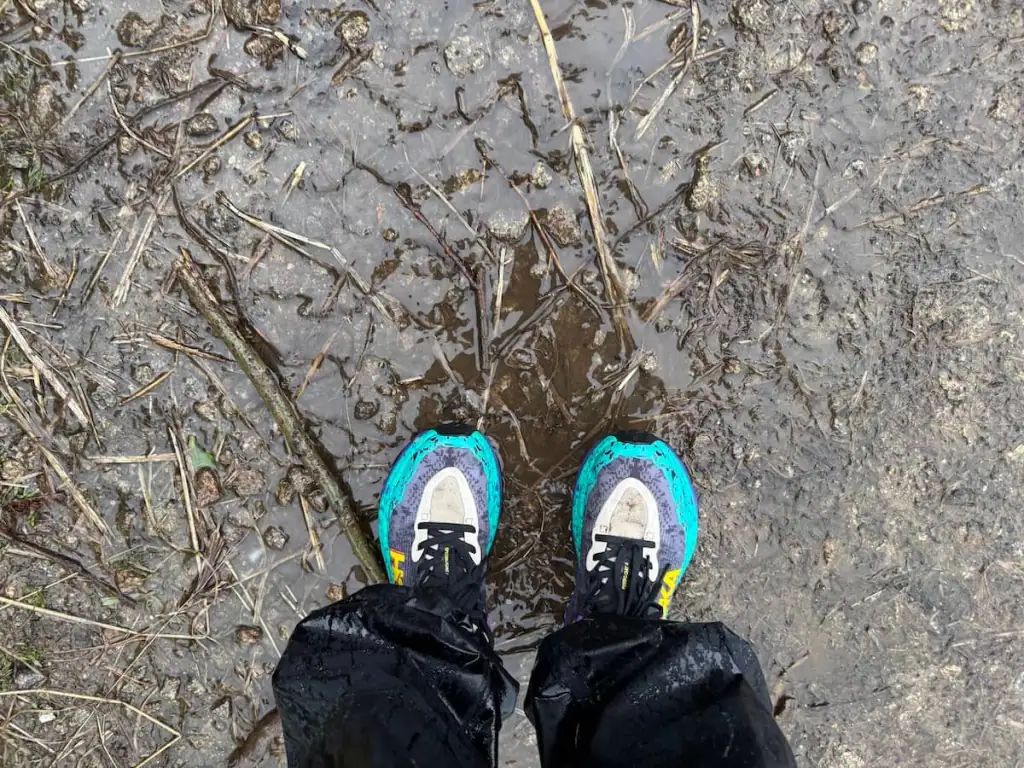
Water Resistance
A breathable mesh upper means these shoes are not technically water resistant or waterproof. Hoka sells a waterproof Gore-Tex version, but it would be a mistake to purchase that version for the Camino because you're more likely to sweat inside the shoe and get blisters.
That said, I found the shoes to generally keep my feet fairly dry in light rain. It rained multiple days on my last Camino, but the only day I remember my shoes getting really wet was the day it was pouring and I had to walk through puddles.
Protection for Your Feet
Like most trail shoes, the Hoka Speedgoat 6 provides good protection for your feet from things like rocks and sticks that you're bound to encounter on the trail. The shoes have toe bumpers on the ends and reinforced uppers.
The shoes don't have a rock plate, but their high amount of cushioning helps keep your foot from feeling too much discomfort from rocky terrain.
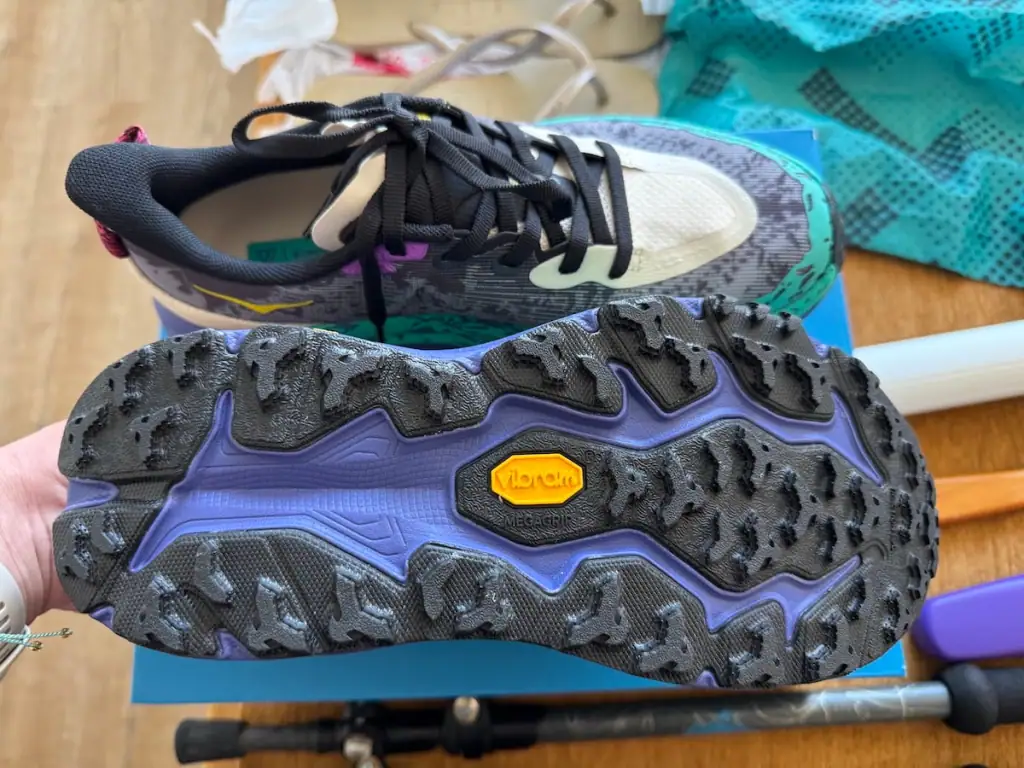
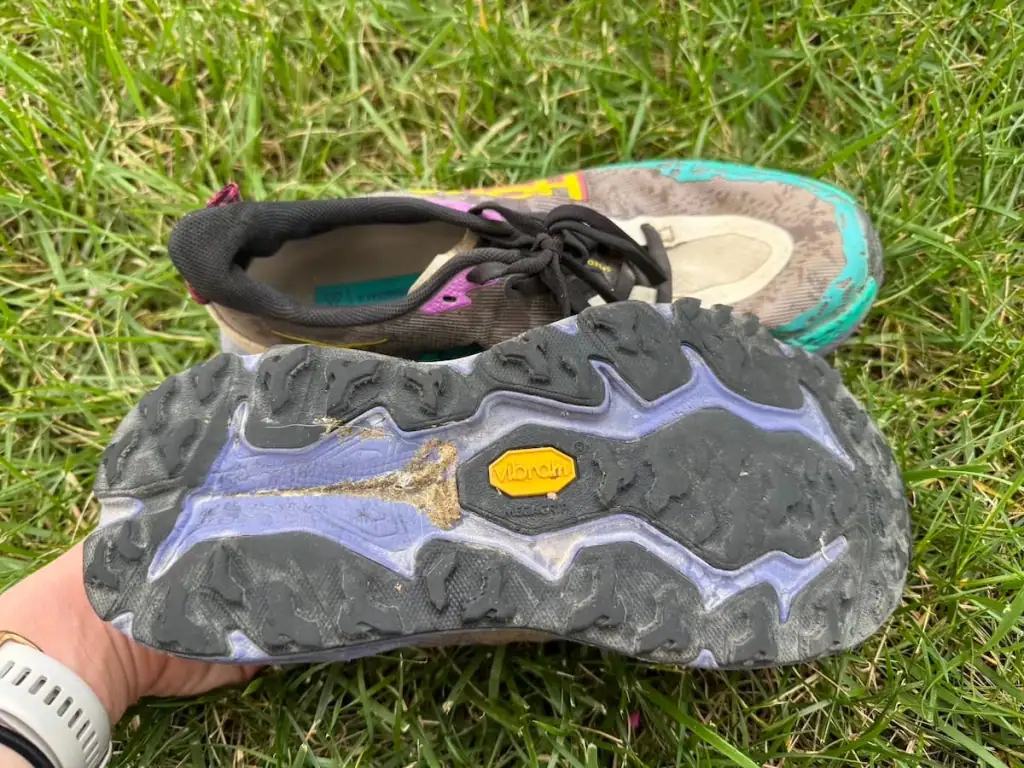
Durability
I hiked 326 miles (525 km) in my Speedgoat 6 shoes on my last two Caminos. For having worn these for so long, I think they're in great condition. Keep in mind that typically the rule of thumb is to replace trail running shoes every 300-500 miles.
Generally, I think the Camino is harder on shoes for a few reasons:
- You put some added strain on the shoes by hiking with a pack on every day.
- The shoes don't have much time to rest and reset in between walks.
- Shoes like the Speedgoats weren't designed to do quite so much road walking, especially on the Camino Portugués.
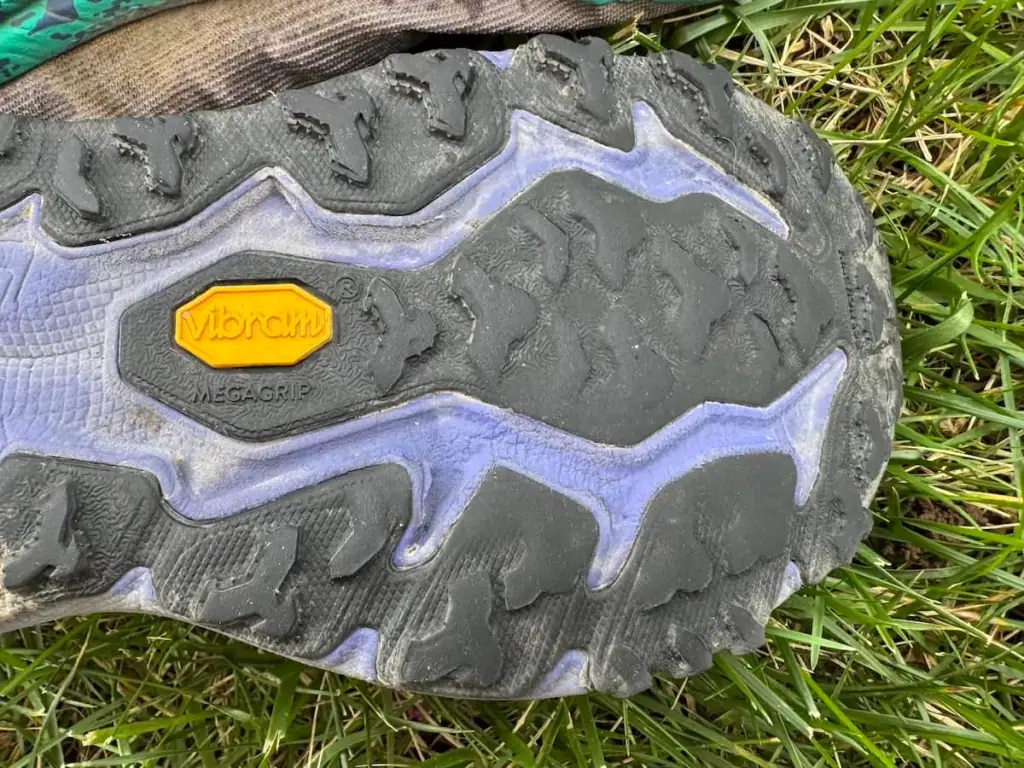
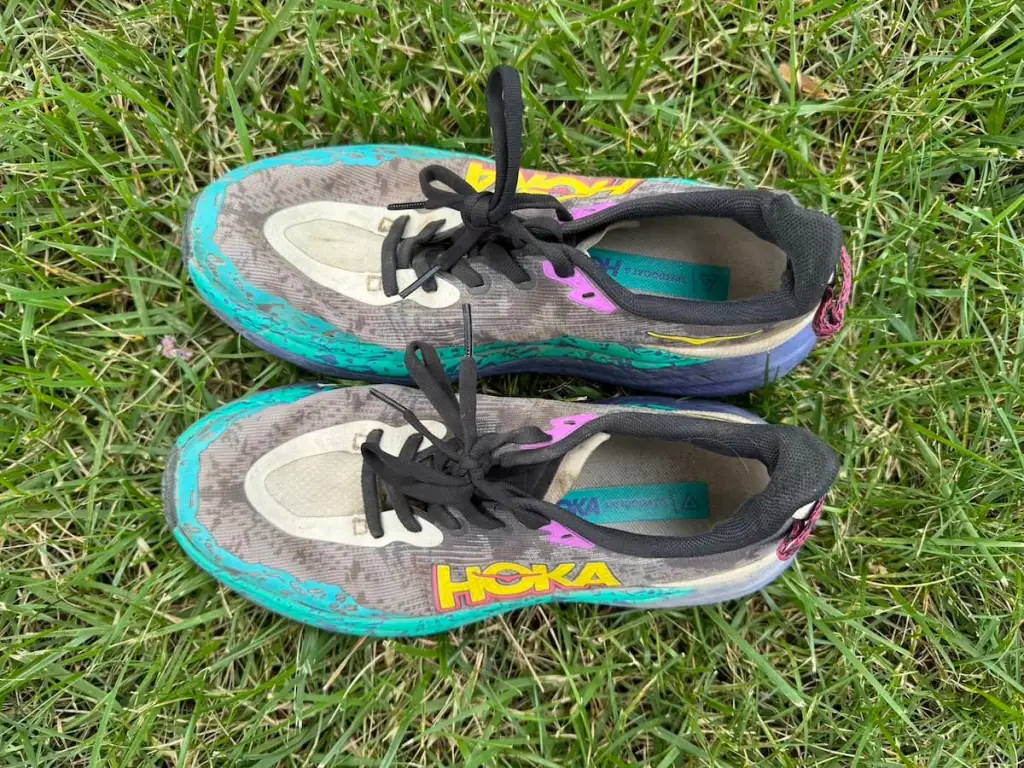
Looking at my shoes now, you can see there are some areas where the lugs have almost completely worn down. Otherwise, they're still in great shape though with the uppers in tact and some cushioning still there in the midsole.
In spite of some of the lugs wearing down, I still felt a strong grip on some big uphills and downhills in my last few days on the Camino.
Interestingly, there are certified Vibram® cobblers in the U.S. and other parts of the world that can repair or resole your shoes. That said, if you need a resole, it's probably worth it to just buy a new shoe at that point because the cushioning will wear down soon anyways.
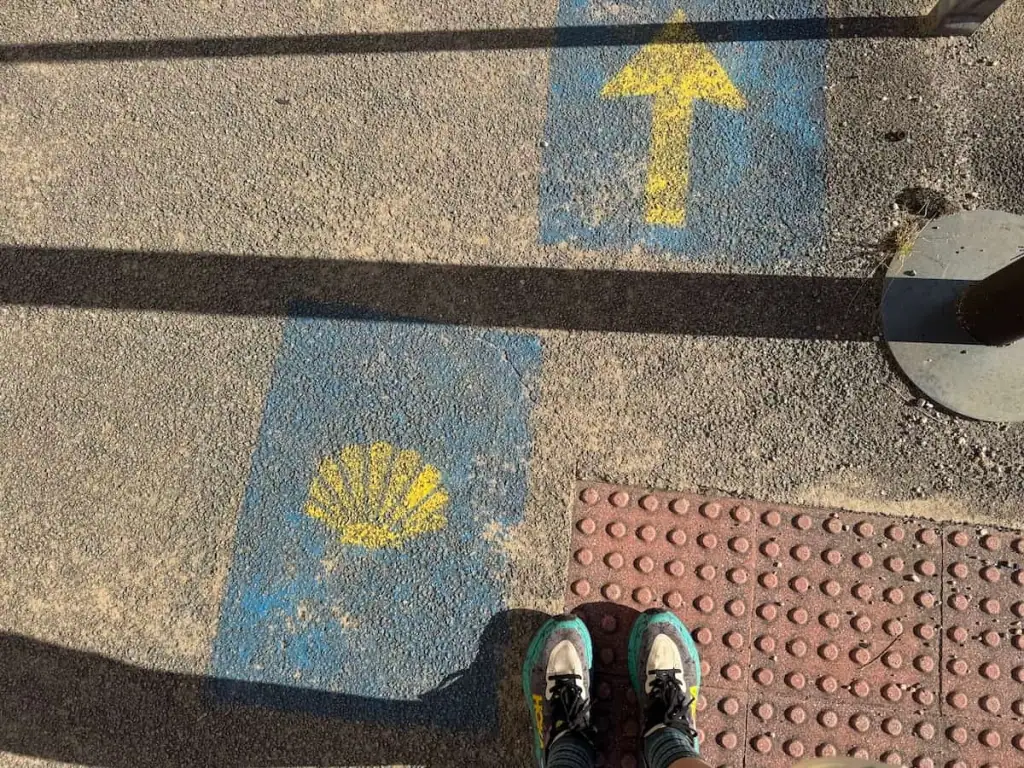
Feel Out of the Box
Unlike hiking boots that can need around 20 miles (32 km) or more to break in, trail running shoes generally don't need much, if any, breaking in period. However, it's a good idea to give your feet some time to adjust to anything new before you do any hikes that are too long.
One of my biggest tips for others wanting to hike the Camino is to test out all gear thoroughly before you go. You don't want to end up on the trail with something that's going to hurt you when walking long distances every day.
I find that Hoka Speedgoats generally feel pretty comfortable right out of the box. I wouldn't recommend starting your Camino immediately after buying the shoes, but it's what I did for my last two pairs of Speedgoats and I had no issues.
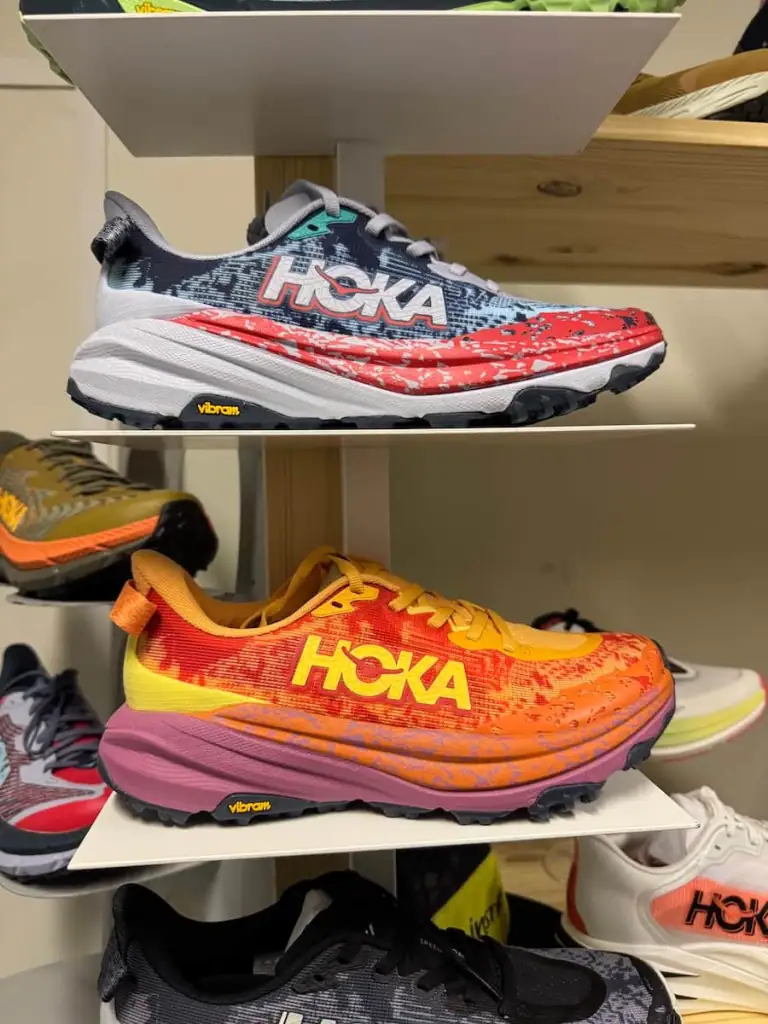
Shoe Colors
Hoka is known for their fun variety of shoe colors and the Speedgoats are no exception. As of writing this, the Speedgoat 6 comes in 14 different color waves. Here are some of my favorite color combos for your reference:
- Light blue, lavender, and seafoam green
- Dark lavender and light lavender
- Cherry and dark purple
- Navy and turquoise
While shoe color is fun, I think it can also be helpful for visibility purposes to have brightly colored shoes.
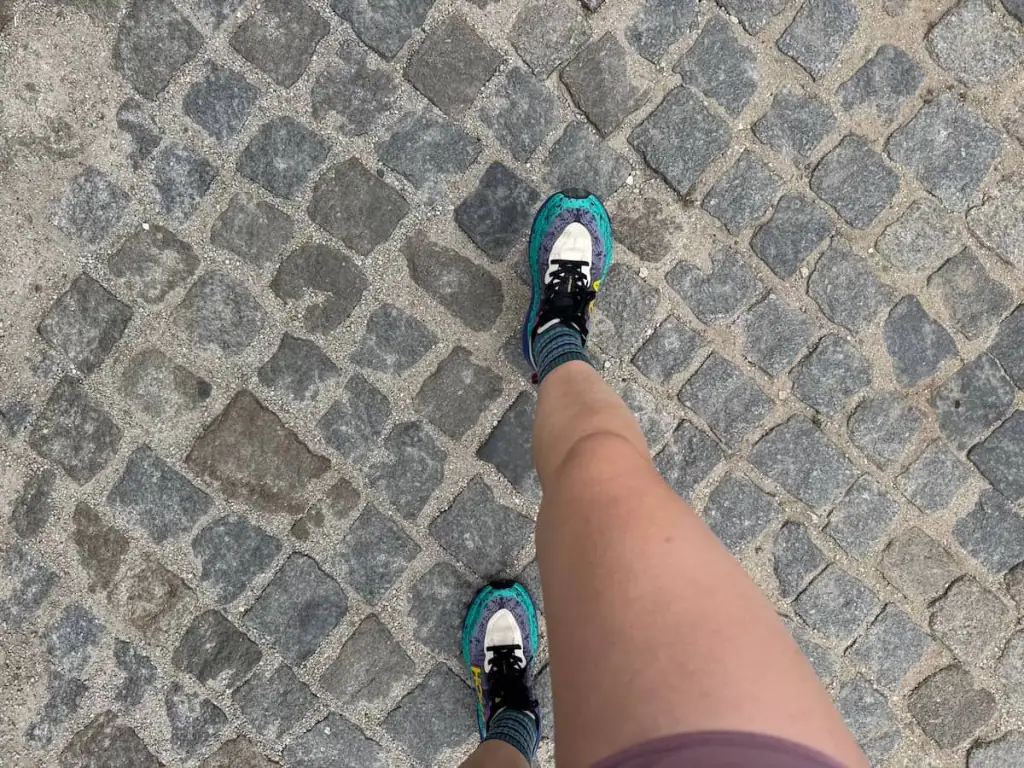
How Does the Hoka Speedgoat 6 Compare to the 5?
I was admittedly nervous to try the Speedgoat 6 because I'd heard some people complain about them compared to previous versions. But honestly, I still had a great experience with the 6 and didn't notice a difference from the 5 (although it had been two years).
According to Runner's World, here's how the 6 differs from the 5:
- Improved durability in the upper and midsole
- Reinforcements in the midfoot to help keep your foot locked in place
- Slightly narrower shape but a softer mesh in the forefoot area that allows for more movement
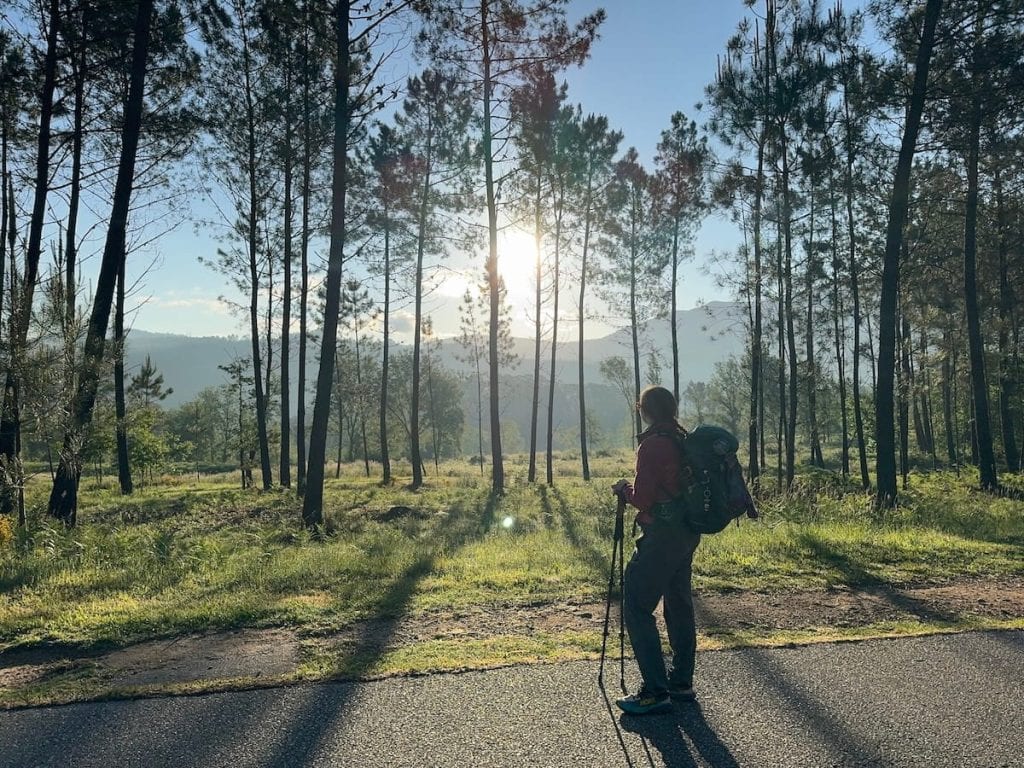
Tips for Buying Hoka Speedgoats for the Camino
As you think about buying Hoka Speedgoats for your Camino, here are some tips to keep in mind:
- Get at least a half size or full size up since these shoes run smaller and your feet are likely to swell on the Camino.
- Make sure to wear your Camino socks as you figure out sizing. I recommend merino wool socks.
- Don't buy Gore-Tex waterproof shoes because you're much more likely to get blisters especially if you're hiking in warmer months. Plus the shoes will take longer to dry out when they get wet.
- Try out a few different kinds of shoes because while these are my favorite shoes for the Camino, everyone's foot is different and you might be surprised by what you prefer.
- If possible, purchase your shoes from a store like REI where you can return the shoes worn within one year if they don't work out for you. Thankfully trail running shoes don't take long to break in, but sometimes you just don't know how your foot may respond until you start doing longer walks outside.

The Verdict: Should You Buy Hoka Speedgoats for the Camino?
It's no surprise that Hoka Speedgoats have become a Camino favorite. From their plush cushioning, reliable grip, and ability to handle everything from cobblestones to rugged trails, they're definitely a standout option.
That said, no shoe is perfect for everyone. We all have our own unique feet and preferences, so it's important to choose a shoe that ultimately feels most comfortable to you.
Buy the Hoka Speedgoat 6
Ready to try out Hoka Speedgoats for the Camino? Check out the latest version I wore on my last two Caminos here:
Read About Other Top Camino Shoes
If you're still on the fence, check out this roundup of some of the top Camino shoes that pilgrims love.
Keep Packing for the Camino
Shoes are just the start when it comes to prepping gear for your Camino! Get my full Camino packing guide for women here to make sure you hit the trail fully prepared.
